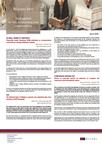
Mazars Info April 2020
GLOBAL MOBILITY SERVICES
Frequently Asked Questions (FAQ) published on remunerations received from a foreign affiliated company
As from March 1, 2019, the Belgian government imposed new obligations on - often equity-based – benefits and remuneration received from an affiliated foreign company. This is regardless of whether the Belgian company acts as an intermediary or whether the related costs are recharged to the Belgian entity. On the one hand, the Belgian employer has to withhold taxes on this remuneration and has to report the granted benefits on the salary statement of the employee on the other hand. We refer to our Mazars Info of March 2019 and our Global Mobility Alert of April 2019 for more information in this regard.
Nevertheless, there were still a lot of uncertainties regarding the scope of these new regulations. On April 7, 2020, the Belgian tax authorities have finally published a circular letter with FAQ’s that should shed light on the interpretation of the legislation introduced last year.
As expected, the circular letter has a broad interpretation of the understanding of the term ‘beneficiary’ of the remuneration received from the foreign affiliated company as from March 1, 2019.
A few key takeaways:
The beneficiary can be a Belgian resident as well as a Belgian non-resident;
- The beneficiary can be an employee as well as a (self-employed) company director;
- It is not required that the professional activity is performed in Belgium;
- A formal labor agreement between the Belgian entity and the beneficiary is not required;
- Employees from a foreign affiliated company seconded to the Belgian company are also in scope.
Of course, a lot of specific situations are not discussed in the FAQ and should be assessed on a case by case basis. In case of any questions about these reporting obligations and wage withholding tax consequences, please contact us.
VAT
The new VAT return form for new constructed buildings
The traditional VAT return for construction works (new building) has been abolished. The return had to be filed within 3 months after notification of the cadastral income of the new building/renovation. As of August 20, 2018, owners must provide specific information of the new constructed building within the same 3 months. The new form 111 B57, which replaces the old form 106.3, is described in Circular 2020/C/51.
The new form consists of a questionnaire with 15 questions. Based on these answers, the administration will make selections of files that will be further examined with regard to the normal value of the building and whether the correct VAT rate has been applied.
In addition to the administrative data relating to the building (address, type of building, the references of the planning permission granted by the competent authority), the following information must be provided as it is directly related to the construction of the building:
- The nature of the work carried out on the building (e.g. new construction or reconstruction after demolition) and the VAT rate;
- The relevant architectural characteristics of the building (e.g. the number of floors, the shape of the building, the type of roof);
- The relevant building techniques used (e.g. installation of solar panels, air conditioning, underfloor heating, etc.);
- The cost price excluding VAT of the construction works;
- An overview of the works carried out by the owner of the building;
- The possible destination of the building (e.g. rental or immediate resale).
Based on the approved construction permit, the administration will send a form 111 B57 with an accompanying letter. A selection is made in advance for all new building permits, which means that the obligation to submit the form only applies to the building owners who receive the accompanying letter with the form attached. No spontaneous application has to be done by the owners of these buildings.
As the online application for filing of the new form is not yet available, it should preferably be sent by e-mail to the e-mail address listed in the grey frame on the letter. Failure to submit the form in due time can be subject to tax penalties between 50,00 and 5.000,00 EUR.
CORPORATE INCOME TAX
Clarity on corporate income tax deduction of reception and restaurant costs with publicity nature
After a long time of uncertainty, final guidelines have been set whether reception- and/ or restaurant costs with a publicity nature can be fully deducted for corporate income tax ("CIT") purposes. After years of conflicting views, the Belgian Tax Administration has published a circular that should provide clarity (Circ. 2020/C/42 of March 17, 2020).
For CIT purposes, professional reception and restaurant costs are respectively 50% and 69% deductible (art. 53, 8° and 8°bis BITC). On the other hand, the VAT paid on these categories of expenses can in principle not be recovered. However, the VAT Administration has accepted since 2015 that this deduction limitation does not apply if the taxpayer incurred these costs for a publicity purpose (f.e. in the context of a sales-promoting event). Many taxpayers tried to argue, not without reason, whether this reasoning could be extended to corporate income tax.
Early 2018, Mr. J. Van Overtveldt, Minister of Finance at that time, declared that he could agree to a full income tax deduction if a clear advertising purpose could be demonstrated.
One year later, in 2019, the Belgian Supreme Court ruled, twice in a row, that, for CIT purposes, the publicity nature cannot change the intrinsic nature of reception- and restaurant costs and change consequently, the deduction limitation associated therewith.
Subsequently, due to this contradiction, the Minister of Finance was asked again for his opinion. The current minister (Mr. A. De Croo) stated that he could not support the position of his predecessor, based upon the recently published case law of the Supreme Court.
A new circular published on March 17, 2020, now confirms the current minister’s rejection. It is now very clear that the Tax Administration does not intend to harmonize its VAT approach to income tax in this respect.
Based on this new circular letter and the recent Supreme Court case law, the risk exists that the Belgian Tax Authorities will challenge claimed deductions, éven for the (three) years preceding this circular letter.
Going forward, we recommend to carefully verify the above considerations during the preparation of the TY20 corporate income tax provision and tax return, in the view of the recently introduced minimum taxable basis for tax audit adjustments (no offset of tax deductions possible).
Do not hesitate to contact us with any further questions.
LEGAL
The risk of directors’ liability in the context of insolvency
In the event of imminent financial difficulties, insolvency or even bankruptcy at a later stage within a company, there are many provisions in the current company and insolvency law that directors must take into account nowadays, if they wish not to endanger their liability.
General liability and insolvency rules
The second book of the Companies and Associations Code (the "CAC") contains these provisions which apply to all the legal entities regulated by the CAC.
First of all, in the event of a director detecting material and conclusive facts that could affect the continuity of the company, the administrative body must deliberate on the measures to be taken in order to safeguard the continuity of the economic activity for a minimum period of twelve months.
Furthermore, the (daily) directors as well as all other persons who have actual management authority are liable towards the company for errors committed in the exercise of their duties. This also applies to third parties as far as the misconduct is an extra-contractual fault.
However, they shall only be held liable for decisions, acts or conduct that are manifestly beyond the margin within which normally prudent and careful directors, placed in the same circumstances, may act.
The alarm bell procedure
When the net assets of a company have decreased to less than half and less than one fourth of the capital, the directors must convene a general meeting to deliberate on the future of the company. In addition, the directors must draw up a special report in which they propose whether or not to dissolve the company, and if decided to continue the activity, set out appropriate remedial measures.
In view of the fact that there is no longer any capital in the private limited liability company (a "BV" / "SRL"), an adjusted alarm bell procedure applies there, whereby two criteria must be taken into account. The general meeting of a BV must meet if (1) the net assets are at risk of becoming, or have become, negative; or (2) the administrative body determines that, in accordance with reasonably foreseeable developments, the company will no longer be able to pay its debts as they fall due in the coming twelve months.
If the directors have not convened the general meeting as prescribed, the damage suffered by third parties shall, subject to evidence to the contrary, be deemed to result from the absence of such convening.
Apparent gross negligence
In addition to company law, insolvency law also contains a number of specific grounds for directors’ liability, such as apparent gross negligence.
If, in the event of a company’s bankruptcy, the debts exceed the profits, the directors may be held jointly and severally liable for all or part of the debts of the company up to the amount of the deficit, if it is established that an apparent gross negligence on their part contributed to the bankruptcy.
Wrongful trading
A second basis for liability under insolvency law is the one regarding wrongful trading. If directors continue to run hopelessly lost companies, and thus allow the company to incur new debts by continuing to contract with suppliers when they should have realised that the situation could not be saved, they can be sentenced to a compensation if they have not taken adequate measures. The actions of the director are compared with those that a normally prudent and careful director would have taken in the same circumstances.
As a director of a company in (potential) financial difficulties, one should thus take the above risks into account, and one should monitor and supervise the financial situation of the company with the greatest caution in the event of impending insolvency.
KEEP IN MIND!
Support measures due to the Corona crisis are being taken. Find hereafter the new deadlines.
- VAT return March/Q1/2020 - filing : deadline postponed to May 7, 2020
- VAT retrun March/Q1/2020 - payment: deadline postponed to June 20, 2020
- Client listing (Financial Year 2019): deadline postponed to April 30, 2020
- Wage withholding taxes of March 2020 : deadline June 15, 2020
- Wage withholding taxes of the first quarter of 2020 (January until March) : deadline June 15, 2020
- Social security contributions (Q1/2020) (employee/employer) :
- Final settlement first quarter of 2020: deadline April 30, 2020
- Social security contributions 1st advance Q2/2020 : deadline May 5, 2020
=> Companies that experience economic hindrance and therefore have difficulties to pay their social security contributions on time can apply for an amicable repayment plan from the NSSO.
- Prepayment corporate income tax of Q2/2020 : deadline June 10, 2020
- Forms 281.50 - calendar year 2019 : deadline June 29, 2020


